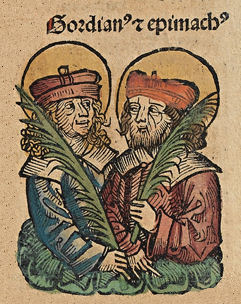This page is based on this
Wikipedia article Text is available under the
CC BY-SA 4.0 license; additional terms may apply.
Images, videos and audio are available under their respective licenses.

Pope Sixtus II was the Pope or Bishop of Rome from 31 August 257 until his death on 6 August 258. He was martyred along with seven deacons, including Lawrence of Rome during the persecution of the Catholic Church by Emperor Valerian.
Year 362 (CCCLXII) was a common year starting on Tuesday of the Julian calendar. At the time, it was known as the Year of the Consulship of Mamertinus and Nevitta. The denomination 362 for this year has been used since the early medieval period, when the Anno Domini calendar era became the prevalent method in Europe for naming years.

The calendar of saints is a traditional Christian method of organizing a liturgical year by associating each day with one or more saints and referring to the day as the feast day or feast of said saint. The word "feast" in this context does not mean "a large meal, typically a celebratory one", but instead "an annual religious celebration, a day dedicated to a particular saint".

Saints Faith, Hope and Charity are a group of Christian martyred saints, venerated together with their mother, Sophia ("Wisdom").

The Forty Martyrs of England and Wales are a group of Catholic men and women executed between 1535 and 1679 for treason and related offences under various laws enacted by Parliament during the English Reformation. The individuals listed range from Carthusian monks who in 1535 declined to accept Henry VIII's Act of Supremacy, to seminary priests who were caught up in the alleged ‘Popish Plot’ against Charles II in 1679. Many were sentenced to death at show trials, or with no trial at all.

May 8 – Eastern Orthodox Church calendar – May 10

Saint Euphemia, "well-spoken [of]", known as the All-praised in the Orthodox Church, is a Christian saint, who was martyred for her faith in 303 AD. According to Christian tradition, this occurred at Chalcedon.
The Church of England commemorates many of the same saints as those in the General Roman Calendar, mostly on the same days, but also commemorates various notable Christians who have not been canonised by Rome, with a particular though not exclusive emphasis on those of English origin. There are differences in the calendars of other churches of the Anglican Communion.
The General Roman Calendar is the liturgical calendar that indicates the dates of celebrations of saints and mysteries of the Lord in the Roman Rite, wherever this liturgical rite is in use. These celebrations are a fixed annual date; or occur on a particular day of the week ; or relate to the date of Easter. National and diocesan liturgical calendars, including that of the diocese of Rome itself as well as the calendars of religious institutes and even of continents, add other saints and mysteries or transfer the celebration of a particular saint or mystery from the date assigned in the General Calendar to another date.

The Twenty-Six Martyrs of Japan were a group of Catholics who were executed by crucifixion on February 5, 1597, at Nagasaki. Their martyrdom is especially significant in the history of Catholic Church in Japan.

Saints Gordianus and Epimachus were Roman martyrs, who are commemorated on 10 May.

Saint Epimachus was a Roman martyr, and is commemorated on 10 May.

The term "saint" is a context-specific translation of the Latin "sanctus", meaning sacred, and originally referred to a sacred person—however, since the 10th century, the Church has reserved the status of saint to people its official canon law has recognised for outstanding Christian service and conduct. When the Church of England was in union with Rome saints arose in the form of canonisation. Those martyrs and confessors recognised before the 10th century and since the break with Rome in the 16th century are generally still considered both "saints" and "Saints". "Hero/heroine" are sometimes used to refer to those holy people whom the church synod or an individual church praises as having had special benevolence who have lived and died since the split with Rome. It considers such muted terms a reversion to a more simple and cautious doctrine which emphasises empowerment (subsidiarity) to all members and components of the church.

Saint Placidus was a disciple of Saint Benedict. He was the son of the patrician Tertullus, was brought as a child to St. Benedict at Sublaqueum (Subiaco) and dedicated to God as provided for in chapter 69 of the Rule of St. Benedict (oblate).

Hripsime, also called Rhipsime, Ripsime, Ripsima or Arsema, was a martyr of Roman origin; she and her companions in martyrdom are venerated as the first Christian martyrs of Armenia.
Mysterii Paschalis is an apostolic letter issued motu proprio by Pope Paul VI on 14 February 1969. It reorganized the liturgical year of the Roman Rite and revised the liturgical celebrations of Jesus Christ and the saints in the General Roman Calendar.
The calendar of saints of the Episcopal Anglican Church of Brazil follows the tradition of The Episcopal Church (TEC), from whom it was a missionary district until 1965. TEC's calendar of saints, in turn, has its origins in the calendar of the Church of England and in the General Roman Calendar. As such, IEAB commemorates many of the figures present in the Roman Calendar, most of them on the same dates, but it also commemorates various notable Post-Reformation uncanonized Christians, especially those of Brazilian origin.











